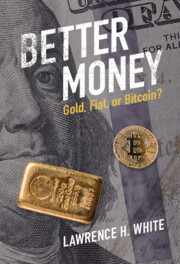Book contents
- Better Money
- Better Money
- Copyright page
- Dedication
- Contents
- Figures
- Acknowledgments
- Introduction
- 1 Markets and Governments in the History of Money
- 2 How a Gold Standard Works
- 3 Common Misconceptions about the Gold Standard
- 4 How a Fiat Standard Works
- 5 How a Bitcoin Standard Works
- 6 Comparing and Contrasting Gold and Bitcoin Standards
- References
- Index
1 - Markets and Governments in the History of Money
Published online by Cambridge University Press: 16 March 2023
- Better Money
- Better Money
- Copyright page
- Dedication
- Contents
- Figures
- Acknowledgments
- Introduction
- 1 Markets and Governments in the History of Money
- 2 How a Gold Standard Works
- 3 Common Misconceptions about the Gold Standard
- 4 How a Fiat Standard Works
- 5 How a Bitcoin Standard Works
- 6 Comparing and Contrasting Gold and Bitcoin Standards
- References
- Index
Summary
Chapter 1. Where can we look for better money: to the market or to the state? It is a myth that better money has always, and can only, come from government or other collective action. Theory and historical evidence indicate that the “state theory of money” is false: Private initiative gave rise to the earliest commodity monies to serve the needs of commerce. Although sovereign states commandeered the coinage in antiquity, not to improve it but to extract revenue, we provide the evidence that private mints worked well when and where they were allowed. Silver and gold coins were valued by weight, not by which ruler’s face was stamped upon them. Private currencies in the form of redeemable banknotes were the most popular form of payment in the nineteenth century, and their introduction preceded government paper currencies. Central banks in monopolizing the issue of currency and obstructing international specie flows did not improve the monetary system but the contrary. While contemporary [italic]fiat[/italic] money (non-commodity money issued by government) rests on the power of the state, gold and Bitcoin do not require the imprimatur of the sovereign to serve as good money.
- Type
- Chapter
- Information
- Better MoneyGold, Fiat, or Bitcoin?, pp. 6 - 38Publisher: Cambridge University PressPrint publication year: 2023



